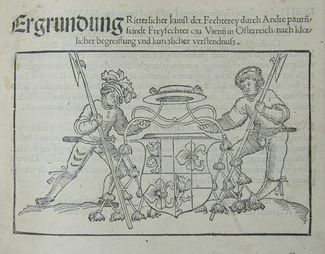|
|
You are not currently logged in. Are you accessing the unsecure (http) portal? Click here to switch to the secure portal. |
Difference between revisions of "Ergrundung Ritterlicher Kunst der Fechterey (Andre Paurenfeyndt)"
| Line 90: | Line 90: | ||
| width = 56em | | width = 56em | ||
}} | }} | ||
| − | {| class=" | + | {| class="floated treatisecontent" |
|- | |- | ||
! <p>{{rating|m}}</p> | ! <p>{{rating|m}}</p> | ||
Revision as of 02:25, 26 May 2017
| Ergrundung Ritterlicher Kunst der Fechterey | |
|---|---|
| Foundation of the Chivalric Art of Swordplay | |
 Title page of the 1516 edition | |
| Also known as | La noble science des ioueurs d'espee |
| Author(s) | |
| Illustrated by | Unknown |
| Place of origin |
|
| Language |
|
| Genre(s) | Fencing manual |
| Publisher |
|
| Pages | 74 |
| Extant copies |
|
| Treatise scans | Digital scans (1538) |
Ergrundung Ritterlicher Kunst der Fechterey ("Foundation of the Chivalric Art of Swordplay") is a German fencing manual by Andre Paurñfeyndt printed in 1516 in Vienna.[1] The text shows some connection to the tradition of Johannes Liechtenauer, but with significant unique material.
Sydney Anglo notes that Paurñfeyndt's is likely the earliest printed treatise on swordsmanship that includes illustrations.[2]
Contents
Publication History
Paurñfeyndt's Ergrundung Ritterlicher Kunst der Fechterey was first published in Vienna in 1516 by Hieronymus Vietor. In 1538, it was translated into Middle Walloon (a language related to French) and published by Willem Vorsterman in Antwerp,[3] where it was retitled La noble science des ioueurs d'espee. This translation omits all of Liechtenauer's verse, but retains the balance of the content and the original images. Sections of Paurñfeyndt's text were also reproduced in a 1530s book by Christian Egenolff entitled Der Altenn Fechter anfengliche kunst.
Some time before 1520, the section on pole weapons was copied into the MS German Quarto 2020 by an unknown scribe; based on the timeline and geography, it's possible that Paurñfeyndt was directly involved in this venture. In 1564, Lienhart Sollinger created a new manuscript copy of this text, which was later bound by Paulus Hector Mair into the Codex I.6.2º.2.
Contents
| 1 - 2 | Preface by Andre Paurñfeyndt | ||||||
|---|---|---|---|---|---|---|---|
| 3 - 44 | Long sword by Andre Paurñfeyndt | ||||||
| 45 - 58 | Dussack by Andre Paurñfeyndt | ||||||
| 59 - 65 | Staff by Andre Paurñfeyndt | ||||||
| 66 - 67 | Dagger by Andre Liegniczer | ||||||
| 68 - 69 | Sword and buckler by Andre Liegniczer | ||||||
| 69 - 70 |
|
Gallery
Title pages
Illustrations
Additional Resources
- Jaquet, Daniel; Walczak, Bartłomiej. "Liegnitzer, Hundsfeld or Lew? The question of authorship of popular Medieval fighting teachings". Acta Periodica Duellatorum 2(1): 105-148. 2014. doi:10.1515/apd-2015-0015.
References
Copyright and License Summary
For further information, including transcription and translation notes, see the discussion page.
| Work | Author(s) | Source | License |
|---|---|---|---|
| Images | Herzog August Bibliothek | Herzog August Bibliothek | |
| Transcription (1516) | Michael Chidester | Index:Ergrundung Ritterlicher Kunst der Fechterey (Andre Paurñfeyndt) | |
| Transcription (1538) | Olivier Dupuis, Didier de Grenier, Michael Huber | Index:La noble science des ioueurs d'espee (Andre Paurñfeyndt) |


































